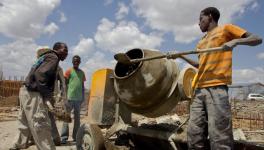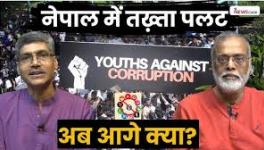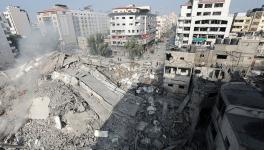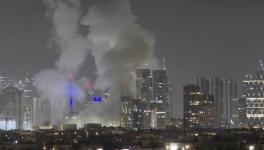Venezuela under Siege and the Resistance
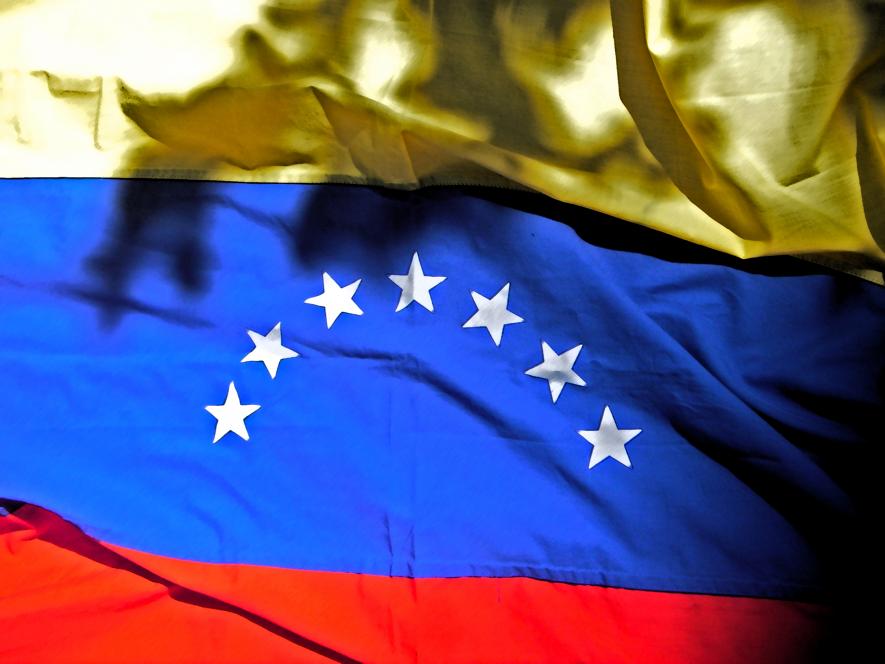
FOR the last six weeks, Venezuela is in the grip of violent protests organised by the opposition groups demanding the ouster of democratically elected president Nicholas Maduro. According to certain reports, 42 people have lost their lives in these protests. A substantial section of the mainstream media is blaming the Venezuelan government for the ongoing protests and violence. Many people around the world are genuinely worried after learning about the developments in Venezuela through the media. In this background, it is imperative for us to understand what is happening in Venezuela, the country which had emerged as a beacon of hope in the fight against imperialism and for the rights of the poor people under the leadership of Hugo Chavez.
Venezuela’s defiance of the imperialist world order and neo-liberal globalisation, its role in the establishment of ALBA, CELAC and other anti-imperialist groupings and finally its commitment towards social justice and elimination of inequalities have won many admirers not only in Latin America, but also in other regions of the world.
US, irked by the strident anti-imperialism of Venezuela, is pumping billions of dollars to fund opposition groups, influence military and promote coups and even sabotage its economy. The death of Hugo Chavez was considered as an opportune moment to carry on its plans with added vigour.
Nicolas Maduro, who succeeded Chavez as the president of Venezuela, vowed to strengthen the Bolivarian Revolution and continue the policies initiated by the ‘eternal leader’. Egged on by the US, opposition parties led by oligarchs launched violent protests in the country since the initial days of Maduro’s presidency, in order to prevent him from consolidating the Bolivarian Revolution. Using their control over nearly 80 per cent of the industrial production in the country, they started an economic warfare against the government. They created artificial shortages by hoarding daily essentials necessary for peoples’ consumption. They also hiked the prices of various commodities, taking them out of reach of the common people. With the help of the US, they started manipulating the exchange rate of Bolivars.
The Bolivarian government tried to meet this situation by enforcing price controls and raiding the godowns of the hoarders. Various measures were taken up for currency controls and reining inflation. All these measures could not plug the damage done to the economy, which is already reeling under the falling oil prices in this period of global economic crisis.
SOCIAL WELFARE MEASURES INTACT
In spite of all these hardships, the Bolivarian government did not cut any of the social welfare missions it had initiated. It continued to provide free health care and education to the people of the country. According to the latest UN Human Development Index, Venezuela is ranked 71 among 188 countries and is in the High Human Development Group. It is well above countries like Mexico (77), Brazil (79), Peru (87) and Columbia (95).
Venezuela stands in the second position amongst all the countries of the world in ensuring universal primary healthcare for its citizens (one primary health centre for every 250 families). Only socialist Cuba is better placed than Venezuela. 97.3 per cent of Venezuelans consume rich protein and 98 per cent children drink a glass of milk.
Venezuela stands second in Latin America (and fifth in the world), among the countries having the maximum number of students in universities. Again it is only socialist Cuba which is ahead of it. It is the second country in the region to achieve universal literacy.
Similarly it is working hard to ensure housing for all. 1,400,127 houses were constructed in the last six years. Community councils, covering a certain number of houses in a neighbourhood are formed to address the concerns of the citizens. These are now being strengthened.
To overcome the artificial shortages, the government created the ‘Local Supply and Production Committees (CLAP)’, a mechanism for the direct organisation and distribution of food from the basic food basket and products at fair prices throughout the country. Datanalisis, a research organisation, states that about 50 per cent of the Venezuelan population receives CLAP products. In February this year, it is estimated that 5,734,705 families received these products. Families are expected to receive a monthly food bag and the government intends to progressively reduce this period to every 15 days. Each food bag contains corn flour, edible oil, rice, pasta, powdered milk, beans, sugar, wheat flour, tomato sauce, butter, coffee, tuna and sardine can. It should be reiterated here that access to food is a social right guaranteed by the constitution of Venezuela and the government is trying its best to ensure this right to food is implemented in spite of all the difficulties.
As has been the practice every year, even in the recent May Day rally, Maduro announced a 60 per cent hike in minimum wages for the working class.
It is all these pro-people measures that are keeping people severely affected by the economic sabotage of the oligarchs away from joining the anti-government protests. This of course does not mean that the people of Venezuela are totally satisfied with the government and are not having any complaints. People are unhappy with the slow pace of transformation taking place in their country. They are not happy with the corruption, the lethargy of bureaucracy in implementing the decisions of the Bolivarian government. They are also concerned about the dissensions in the ranks of the ruling party and the Left. The opposition is trying hard to utilise these conditions to fan discontent among people and deprive their crucial support to the Bolivarian government.
WHY IS THE OPPOSITION REFUSING DIALOGUE?
The US inspired opposition, with the help of para-military groups from Colombia is organising violent demonstrations against the government. Even rocket launchers are used by these gangs to carry out their attacks. Many of the fatalities reported in the media during these protests are due to wounds inflicted from very close range. It should be noted here that Venezuelan National Armed Guard, who are to police these protests are barred from carrying any weapon other than, tear gas and water cannons.
The opposition groups are refusing dialogue with the government, despite repeated offers. Even Pope Francis has volunteered to mediate between the government and the opposition in order to ensure peace. But the opposition forces are adamant and are refusing to heed even to the appeals of the Pope. The real reason for their refusal is, they do not have any other demand other than asking the government to quit.
In this background, President Maduro, using the powers granted to him by the Constitution, called for elections to a Constituent Assembly. This will be a 500 member elected body to discuss and debate the changes that need to be incorporated into the Bolivarian Constitution adopted in 2000. Maduro declared that his intention is to ensure constitutional guarantee to all the social welfare missions initiated right from the times of Hugo Chavez. The opposition rejected even this offer. Participation in elections, will force a discussion on their right-wing socio-political and economic agenda, which they fear will be rejected by the people. Instead, they want to persist with violent protests and destabilise the government. They want to provoke the Chavistas through violence and project Venezuela as a ‘failed State’ before the entire world using their hold over media. Unfortunately for them, people are not falling into their trap.
The Bolivarian government is trying hard to mobilise Chavistas and all the people supporting it onto the streets in defence of the Revolution. Every other day huge rallies are being organised by the pro-revolutionary forces. The huge rally on May Day galvanised all sections of the society to march in defence of the Revolution. Women, youth, students, fishers, farmers, working class have organised their respective sectoral marches, bringing in hundreds of thousands of people. Recently mothers have organised a march on the Mother’s Day, along with their children. All these people are coming out braving the attacks of the armed thugs of the opposition.
The success of the Bolivarian Revolution and its continuation, ultimately depends on its ability to rouse the consciousness of the people and prepare them to counter all the destabilisation efforts.
What we are witnessing in Venezuela today is hence an intense class struggle – struggle between imperialist supported oligarchs and the exploited people in the barrios of Venezuela. It is our bounden responsibility as internationalists to express our solidarity with the struggling people of Venezuela, who are resisting the imperialist might to subjugate their country.
Image courtesy:https://www.google.co.in
Disclaimer: The views expressed here are the author's personal views, and do not necessarily represent the views of Newsclick.
Get the latest reports & analysis with people's perspective on Protests, movements & deep analytical videos, discussions of the current affairs in your Telegram app. Subscribe to NewsClick's Telegram channel & get Real-Time updates on stories, as they get published on our website.









